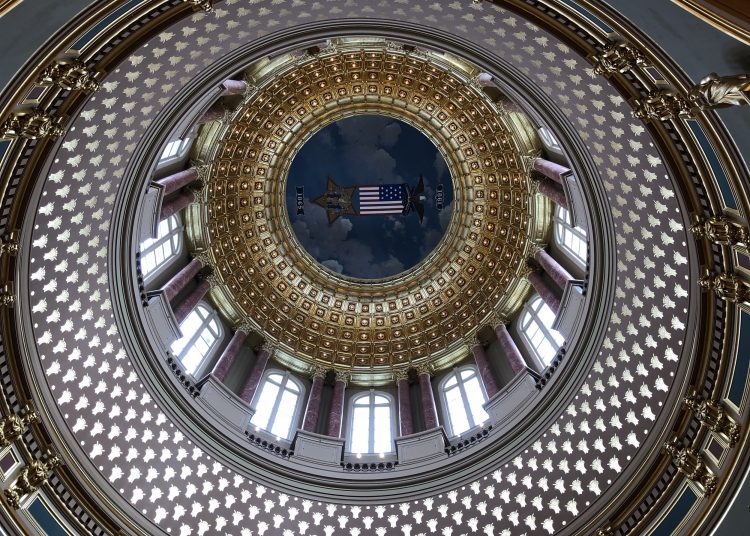DES MOINES, Iowa – The Iowa House of Representatives passed HF 2577, a bill that requires school districts to provide parents access to class instructional materials, passed by a 60 to 36 party-line vote on Tuesday evening.
State Rep. Charlie McConkey, D-Council Bluffs, was the only Democrat to vote with Iowa House Republicans for the bill.
The legislation requires school districts to post the syllabus, textbooks, and related core and instructional materials to an online portal parents can access. It also requires a catalog of every school library book to be available online and allows parents to tell the school if there are books their child is prohibited from checking out.
The bill also requires a civics test to be given to students taking U.S. Government based on the citizenship test administered by the U.S. Customs and Immigration Service.
“Iowa parents have raised concerns over age-inappropriate material and left-leaning curriculum in their child’s classroom and school libraries,” Thompson said. “I believe that parents matter, and they deserve a voice in their child’s education. The best way to give them back their voice is to increase transparency. Parents deserve to know what their child is being taught,” State Rep. Phil Thompson, R-Jefferson, the bill’s manager, said in a released statement.
The bill was amended to allow teachers to update their information throughout the year, clarify that the legislation does not require lesson plans to be posted, and provide 14 days for teachers or school districts to correct any violation found by the Iowa Department of Education.
State Rep. Garrett Gobble, R-Ankeny, an educator, offered one of the amendments, said it was necessary to clarify that the legislature’s intent is that information material provided to students is made available to parents, not teacher lesson plans.
Both amendments were approved by the Iowa House, one in a unanimous 96-0 recorded vote and the other in a voice vote.
State Rep. Tracy Ehlert, D-Cedar Rapids, an early childhood educator, noted the bill was improved, but she still could not support the bill.
“I really feel like we were listened to and our input taken into consideration. As a teacher, I still have to look at the burden that this will create on teachers, especially in the K through five setting where they’re going to constantly having to be updating these materials. I believe in transparency, but I’m going to have to be a no for that reason,” she said.
State Rep. Mary Mascher, R-Iowa City, a retired educator, made a similar complaint.
“It takes away from student learning, when we have teachers that are now going to be required to spend a portion of their day, writing down and identifying what they are going to be teaching in terms of materials, and updating that on a regular basis. If they change any curriculum, and have new materials that they are putting forth before their students, that’s going to take time away from learning,” she argued.
State Rep. Sharon Steckman, R-Mason City, a retired educator, said the bill attacks teachers and is another unfunded mandate.
“This bill is targeting teachers to the detriment of our children. My school is cutting 20 teachers this year because they don’t have enough money. This bill, according to the fiscal note, will cost $16.4 million, more money mandated and taken away from our children. This weekend, I spent some time talking to teachers. And they are totally discouraged by the attacks that have been made on them in this building. And they’re the ones that are working with our children every day to give them that great education,” she said.
Steckman also wondered why accredited non-public schools were not included in the bill.
State Rep. Molly Donahue, D-Cedar Rapids, an educator, said he was for transparency and “99 percent of teachers do what they are supposed to do,” but the bill is not about transparency.
“This is not about transparency, because if it were, as Representative Stegman just said, we would be looking at the all of the accredited education facilities across the state, even if they’re private, that are receiving tax dollars,” she said.
“So this is not about transparency. It’s another public school attack. It’s public school teacher tracking and targeting. That’s what this bill should be called,” Donahue said.
Gobble rose in support of the bill after several House Democrats spoke in opposition.
“I disagree with the notion that this bill is an attack. I believe it’s establishing best practice for students and parents to be able to access materials outside of the school day, something most of our teachers already do through Google Classroom, Canvas ,and other other learning management software,” he said.
Gobble added that the biggest beneficiary of the law would be students in remote learning situations or students who miss a day of school.
“I personally already adhere to the principle of this bill in my classroom. It takes me approximately one minute to copy and paste materials to the learning software, whether that be a video, article, PDF, etc. If I ever forget, we’ve built into this bill a 14-day grace period for you to make those corrections and no repercussions are taken,” he added.
“These transparency requirements reflect the best practices being used across our state. I’ve heard several times that teachers are already doing this, that parents have access to these materials. That’s because teachers and everyone in this body know that parents have a fundamental right to know what their children are being taught,” Thompson said during his closing remarks.
Speaker of the Iowa House Pat Grassley, R-New Hartford, praised the passage of the legislation and the work Thompson put into it.
“Rep. Thompson has taken feedback from teachers to ensure that this bill is workable for them,” he said in a released statement. “Most teachers are already using an online platform and this requirement will be easy to meet. Most teachers are already doing the right thing. But this bill will provide accountability for the teachers and administrators who have been using their roles in schools to indoctrinate students into their political thinking.”














